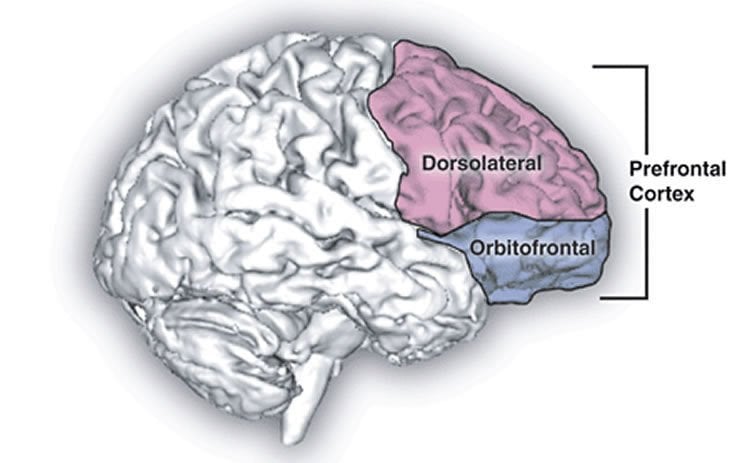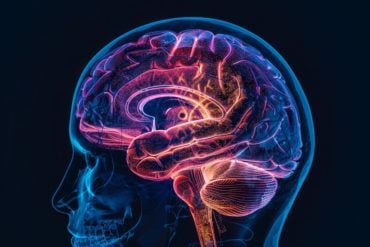Summary: Researchers explore how stress can influence our cognitive performance.
Source: Max Planck Institute.
How does stress influence our cognitive performance? This is an issue scientists at the Max Planck Institute of Psychiatry in Munich have been dealing with. For the first time, they have identified a brain mechanism that explains why the cognitive performance of mice is reduced after being exposed to social stress. This finding will help to improve our understanding and treatment of disorders involving cognitive decline in humans.
The prefrontal cortex is a brain region responsible for mental activity, perception and recognition, in short for cognition. No matter whether we want to respond flexibly to certain situations, have to do several things simultaneously or make plans for the future – none of this would be possible without our prefrontal cortex. However, these processes are very susceptible to stress. Our anger resulting from being stuck in a traffic jam in the morning or trouble with the boss at lunchtime causes social stress. The so-called Corticotropin-releasing factor (CRF) controls our reaction in the prefrontal cortex; however, which exact role it plays was not clear previously.
Therefore, scientists at the Max Planck Institute of Psychiatry tested what exactly happens in the brain during such stressful periods in mice. They exposed mice to acute social stress and observed a cognitive decline in the rodents some hours later. The mice were not able to show cognitive flexibility in a test maze or remember the chronological sequence of events they had learned before.
In order to find out more about the role CRF plays in this process, the scientists blocked the action of the peptide using a drug, a so-called CRF antagonist. This time, the performance of the mice did not decrease several hours after the stressful event; they were able to perform the required tasks as successfully as they had done without stress.

“The crucial point is that we were able to identify the mechanism responsible for the reduction in performance after stress,” Mathias Schmidt, research group leader and head of the study, summarizes. Understanding this mechanism is important in order to comprehend how stress affects our thinking, feeling and perceiving. Since the mechanisms underlying the flexibility in perception and memory performance are similar in mice and humans, it is very probable that the findings are transferable to humans. Many psychiatric diseases such as depression or schizophrenia are accompanied by impaired cognitive function. With their findings, the scientists hope to develop approaches for novel treatments and medications.
Source: Anke Schlee – Max Planck Institute
Image Source: This NeuroscienceNews.com image is in the public domain.
Original Research: Abstract for “Prefrontal cortex corticotropin-releasing hormone receptor 1 conveys acute stress-induced executive dysfunction” by Andrés Uribe-Mariño, Nils C Gassen, Maximilian F Wiesbeck, Georgia Balsevich, Sara Santarelli, Beate Solfrank, Carine Dournes, Gabriel R Fries, Merce Masana, Christiana Labermaier, Xiao-Dong Wang, Kathrin Hafner, Bianca Schmid, Theo Rein, Alon Chen, Jan M Deussing, and Mathias Schmidt in Biological Psychiatry. Published online April 8 2016 doi:10.1016/j.biopsych.2016.03.2106
[cbtabs][cbtab title=”MLA”]Max Planck Institute. “Hormone Causes Decline in Cognition After Social Stress.” NeuroscienceNews. NeuroscienceNews, 1 June 2016.
<https://neurosciencenews.com/social-stress-cognition-4352/>.[/cbtab][cbtab title=”APA”]Max Planck Institute. (2016, June 1). Hormone Causes Decline in Cognition After Social Stress. NeuroscienceNews. Retrieved June 1, 2016 from https://neurosciencenews.com/social-stress-cognition-4352/[/cbtab][cbtab title=”Chicago”]Max Planck Institute. “Hormone Causes Decline in Cognition After Social Stress.” https://neurosciencenews.com/social-stress-cognition-4352/ (accessed June 1, 2016).[/cbtab][/cbtabs]
Abstract
Prefrontal cortex corticotropin-releasing hormone receptor 1 conveys acute stress-induced executive dysfunction
Background
The medial prefrontal cortex (mPFC) subserves complex cognition and is impaired by stress. Corticotropin-releasing hormone (CRH), through the CRH-receptor 1 (CRHR1), constitutes a key element of the stress response. However, its contribution to the effects of stress in the mPFC remains unclear.
Methods
Mice were exposed to acute social defeat stress and subsequently to either the temporal order memory (n=11-12) or reversal learning (n=9-11) behavioral test. Changes in mPFC Crhr1 mRNA levels were measured in acutely stressed mice (n=12). CRHR1loxP/loxP mice received either intra-mPFC AAV-Cre or -empty microinjections (n=17-20), then were submitted to acute stress and later to the behavioral tests. Co-immunoprecipitation was used to detect activation of the protein kinase A (PKA) signaling pathway in the mPFC of acutely stressed mice (n=8) or intra-mPFC CRH injected mice (n=7). Finally, mice received intra-mPFC CRH (n=11) and/or Rp-cAMPS (n=12) microinjections and underwent behavioral testing.
Results
We report acute stress-induced effects on mPFC-mediated cognition, identify CRH-CRHR1 containing microcircuits within the mPFC and demonstrate stress-induced changes in Crhr1 mRNA expression. Importantly, intra-mPFC CRHR1 deletion abolishes acute stress-induced executive dysfunction, while intra-mPFC CRH mimics acute stress-induced mPFC dysfunction. Acute stress and intra-mPFC CRH activate the protein kinase A (PKA) signaling pathway in the mPFC, leading to CREB phosphorylation in intra-mPFC CRHR1-expressing neurons. Finally, PKA blockade reverses the intra-mPFC CRH-induced executive dysfunction.
Conclusion
Taken together, these results unravel a molecular mechanism linking acute stress to executive dysfunction via CRHR1. This will aid the development of novel therapeutic targets for stress-induced cognitive dysfunction.
“Prefrontal cortex corticotropin-releasing hormone receptor 1 conveys acute stress-induced executive dysfunction” by Andrés Uribe-Mariño, Nils C Gassen, Maximilian F Wiesbeck, Georgia Balsevich, Sara Santarelli, Beate Solfrank, Carine Dournes, Gabriel R Fries, Merce Masana, Christiana Labermaier, Xiao-Dong Wang, Kathrin Hafner, Bianca Schmid, Theo Rein, Alon Chen, Jan M Deussing, and Mathias Schmidt in Biological Psychiatry. Published online April 8 2016 doi:10.1016/j.biopsych.2016.03.2106






